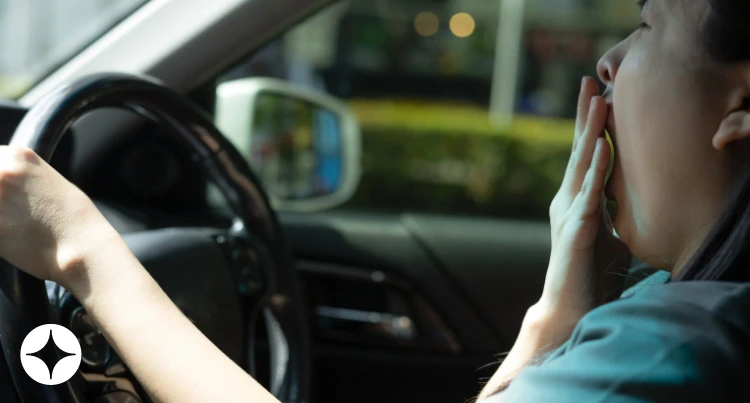
The National Sleep Foundation states that "drowsy driving is a significant public health concern in the United States."[1] It poses a severe threat to drivers, their passengers, other road users and pedestrians. This article examines the dangers of fatigued driving and how quality sleep is paramount for road safety.
Risks of Tired Driving
Based on data from the National Highway Traffic Safety Administration[2], on average, someone in the United States is injured in a road traffic accident every 10 seconds. Statistically, crashes claim a life every 13 minutes. Every year, car accidents result in around 4 million visits to the emergency room. Estimates suggest that almost 42,800 Americans[3] died in motor accidents in 2022.
Although car crashes can have various causes[4], the AAA Foundation for Traffic Safety[5] approximates that drowsy driving causes about one in six fatal car accidents and one in eight crashes that result in hospitalization. Concerningly, a past CDC study[6] revealed that 1 in 25 drivers revealed they had fallen asleep at the wheel in the month preceding the survey.
According to the National Sleep Foundation, drowsy driving has similar effects as drunk driving[7], with 4 or fewer hours of sleep having the same impact as if a person is under the influence. Fatigue impairs alertness[8], attentiveness and performance. Sleep deprivation can harm concentration[9] and memory.[10] It can also affect a person's vision[11] and cause hallucinations[12]. Additionally, because tiredness can also affect a person's mood, emotions and judgment[13], it may increase road rage incidents[14].
Tips for Tired Driving
Although people should avoid driving when tired, fatigue can sometimes creep up on people. Short-term fixes for tired driving include:
- Taking a break
- Sharing the driving
- Splashing water on the face
- Increasing music volume
- Opening the window
- Drinking caffeine
Additionally, various driver- and vehicle-based technologies[15] can alert drivers to potential issues.
How to Reduce Tiredness
A crucial factor for preventing drowsy driving is getting adequate sleep — experts recommend that adults should get between 7 and 9 hours[16] each night. Good sleep hygiene[17] is essential for quality sleep, helping individuals not only fall asleep easily each night but remain asleep[18] to clock up enough restorative rest.
Other tips include:
- Maintaining a set sleep-wake routine
- Spending time in sunshine[19]
- Avoiding late-night meals[20]
- Limiting caffeine[21] and alcohol[22]
- Cleaning and organizing the bedroom[23]
- Using sleep apps[24]
- Removing distractions
- Checking the temperature[25]
- Exercising regularly[26]
- Blocking out blue light[27]
- Adhering to sleep therapy[28]
- Consulting a physician
Furthermore, excessive daytime drowsiness[29] may result from a sleep disorder[30]. Estimates suggest that approximately 50 to 70 million Americans[31] experience disordered sleep, although many individuals remain undiagnosed[32] and untreated. This can further increase the likelihood of drowsy driving, leading to greater road risks.
Essentially, quality sleep is vital for safe driving, and drivers should reduce fatigue to enhance road safety for everyone.
References
- National Sleep Foundation – National Sleep Foundation's 2023 Drowsy Driving Survey
- National Highway Traffic Safety Administration – The National Initiative for Increasing Safety Belt Use
- National Highway Traffic Safety Administration – Early Estimate of Motor Vehicle Traffic Fatalities in 2022
- National Highway Traffic Safety Administration – National Motor Vehicle Crash Causation Survey
- AAA Foundation for Traffic Safety – The Prevalence and Impact of Drowsy Driving
- Centers for Disease Control and Prevention – Drowsy Driving and Risk Behaviors
- National Sleep Foundation – Wait. Drowsy Driving is Like Drunk Driving?
- ScienceDirect – Driver fatigue and highway driving: A simulator study
- MedicalNewsToday – What can lower a person's ability to concentrate?
- Healthline – The Effects of Sleep Deprivation on Your Body
- All About Vision – The harmful effects of sleep deprivation
- National Library of Medicine – Severe Sleep Deprivation Causes Hallucinations and a Gradual Progression Toward Psychosis With Increasing Time Awake
- WebMD – What Lack of Sleep Does to Your Mind
- The University of Michigan Transportation Research Institute – Driver Distraction, Aggression, and Fatigue: A Synthesis of the Literature and Guidelines for Michigan Planning
- National Sleep Foundation – Sleep Health and Safety: Navigating the Road to Alert Driving
- National Heart, Lung, and Blood Institute – How Much Sleep Is Enough?
- SoClean – Everything You Need to Know About Sleep Hygiene
- SoClean – Why You're Not Sleeping Through the Night-And How to Fix It
- SoClean – The Effects of Sun Exposure on Sleep Duration
- SoClean – How Bad Is It to Eat Before Bed?
- National Library of Medicine – The effect of caffeine on subsequent sleep: A systematic review and meta-analysis
- National Library of Medicine – Alcohol and the Sleeping Brain
- SoClean – Organize Your Bedroom for Higher-Quality Sleep
- SoClean – Top Sleep Apps for Improving Your Zzzs
- WebMD – What's the Best Temperature for Sleep?
- Johns Hopkins Medicine – Exercising for Better Sleep
- Healthline – Blue Light and Sleep: What's the Connection?
- SoClean – Our Top Hacks for Improving Your Sleep Therapy Experience
- SoClean – Excessive Sleepiness: Why you might be sleeping all the time
- American Psychiatric Association – What are Sleep Disorders?
- National Heart, Lung, and Blood Institute – What Are Sleep Deprivation and Deficiency?
- American Academy of Sleep Medicine – Economic burden of undiagnosed sleep apnea in U.S. is nearly $150B per year




